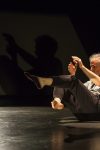Martin Gotfrit co-created Real Time Composition Study, which is part of this year’s Dancing on the Edge. (photo by Paula Viitanen)
To celebrate its 30th year, this July’s Dancing on the Edge festival will feature more than 30 performances, including Real Time Composition Study by Rob Kitsos, Yves Candau and Jewish community member Martin Gotfrit.
“We are three artists with varying interests in dance, sound-making and music, etc., who are exploring creating abstract work spontaneously within the confines of a set space and time,” Gotfrit told the Independent in an email interview. “The work is entirely improvised but, since we’ve been rehearsing (i.e. meeting and exploring movement, sound and light) for 10 months, we have been building an awareness of each other in the space and of our collective efforts. We also work with large conceptual ideas, as well as simple structures, to make it all a little more coherent. The work is not intentionally narrative but words and themes can occasionally emerge.”
Gotfrit not only performs in Real Time, but is its composer. He has numerous recordings to his credit, and has received much recognition, via awards and grants, for his work. Among his affiliations, he is associate composer, Canadian Music Centre; founding member, Canadian Electronic Community; and member, Guild of Canadian Film Composers. He has served two terms as director of the School for the Contemporary Arts at Simon Fraser University and been associate dean and dean of SFU’s faculty of communication, art and technology.
“I’ve just retired after 37 years at SFU as a professor in music and administrator,” he said. “I’ve been performing for a very long time in a variety of ensembles and in many different contexts. As a composer, I’ve created music for film, as well as for new media, theatre and dance performances. I’ve also had the opportunity to move on stage occasionally in those contexts as well. If I had to summarize what I do, I’d say I’m an improviser who has worked in many different forms.”
Gotfrit is part of the Vancouver band Sulam (which means ladder in Hebrew), where he contributes his guitar, mandolin and vocal talents.
“I’m quite active in my synagogue (Or Shalom) and, for more than a decade, I’ve been a part of the band of the monthly Hebrew chanting event Chanting and Chocolate,” he said about his other community involvements. “I returned to be more actively involved in Jewish life as my kids approached bar mitzvah age. I found many like-minded souls at Or Shalom.”
Gotfrit met Kitsos when he started working at SFU, and Candau when he joined the school as a graduate student. About how and when Real Time Composition Study came into being, Gotifrit said, “Rob and I had worked together in the past and we share a love of improvisation and a similar esthetic. We both find Yves’ work very interesting and compatible with our interests. We three started meeting weekly in September of 2017. The work has evolved in many surprising ways since then. For example, when we began, I was sitting off stage playing the music live. As time went on, I began to move more into the centre of the movement space as Yves and Rob (a professional drummer himself) began to take on other roles as well.”
As to what he plans on doing now that he is retired, Gotfrit said, “In addition to playing a wide variety of music with a number of groups (and practising of course), I’m studying to be a pilates instructor. I’ve been a practitioner for almost 40 years. I’m currently interning at the Vancouver Pilates Centre.”
Real Time Composition Study is part of EDGE Seven, July 13, 7 p.m., and July 14, 9 p.m., at Firehall Arts Centre, as is Pathways, by Jewish community member Noam Gagnon (Vision Impure). Other community members involved in Dancing on the Edge this year include Amber Funk Barton (the response.), Gail Lotenberg (LINK Dance Foundation) and Vanessa Goodman (in MascallDance’s OW!). The festival runs July 5-14. For tickets and the full schedule, visit dancingontheedge.org.


